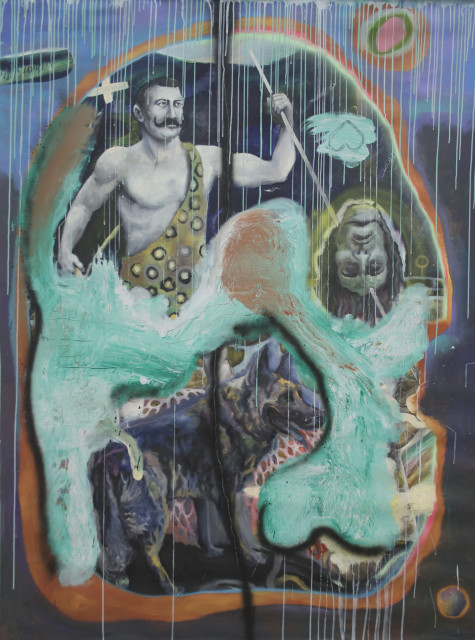Mueller’s work can be described in one word: monumental. As the title already suggests, this exhibition will set sail toward regions unknown, and will take the viewer on an intimate journey, non plus ultra and beyond. “My Father was Many and I am Happy as a Sailor” is the third part of a trilogy of Philip Mueller exhibitions that started at Art Cologne. The third part will include the presentation of Mueller’s first monograph. This trilogy of exhibitions is a gigantic triptych of epic proportions that finally does justice to Mueller’s excessive productivity, and gives him another opportunity to once again push the boundaries of what is possible.
Still in his early twenties, Mueller has already created a unique body of work over the past five years. His oeuvre is a whole universe on its own, oozing of idiosyncrasy. His studio is his dungeon, where the act of painting becomes a shamanistic ritual, and where every canvas initiates a rite of passage. The artist is transformed into an alchemist in search of inner truth and outer space, beyond the usual realms of imagination and material matters. “My Father was Many and I am Happy as a Sailor” is a quest that might seem particular, but Mueller’s intentions are universal: where are we coming from and where are we going? Not only in art, but also in life, in general. For Mueller the answers to these questions are found in the creative act itself: by embracing the inherent narcissism as well as the irony that comes with it. Chaos and structure, excess and asceticism are the coordinates, as the artist becomes a sailor, turning day into night and vice versa: the eternal equinox as a permanent state of mind, his eyes transfixed on a metaphysical horizon, flourishing in the act of creation, yet on the verge of annihilation.
Mueller travels through space and time, always in search of the miraculous. His fathers are many, and he continues to dig through history looking for his ancestors in the extended family he calls “humanity”: from Emperor Franz Josef to Grace Jones, from Nitsch to Jodorowsky, German Romanticism to Deconstructivism, and from Greek Mythology to White Trash. Philip Mueller takes the meaning of heritage very seriously, and his method of choice is to overcome through overload: because when everything means something it also might mean nothing at all. His many fathers gave him a lot, and a spoonful weighs a ton. Mueller is happy as a sailor and as a painter this can only mean one thing: to paint until the oil runs out.

